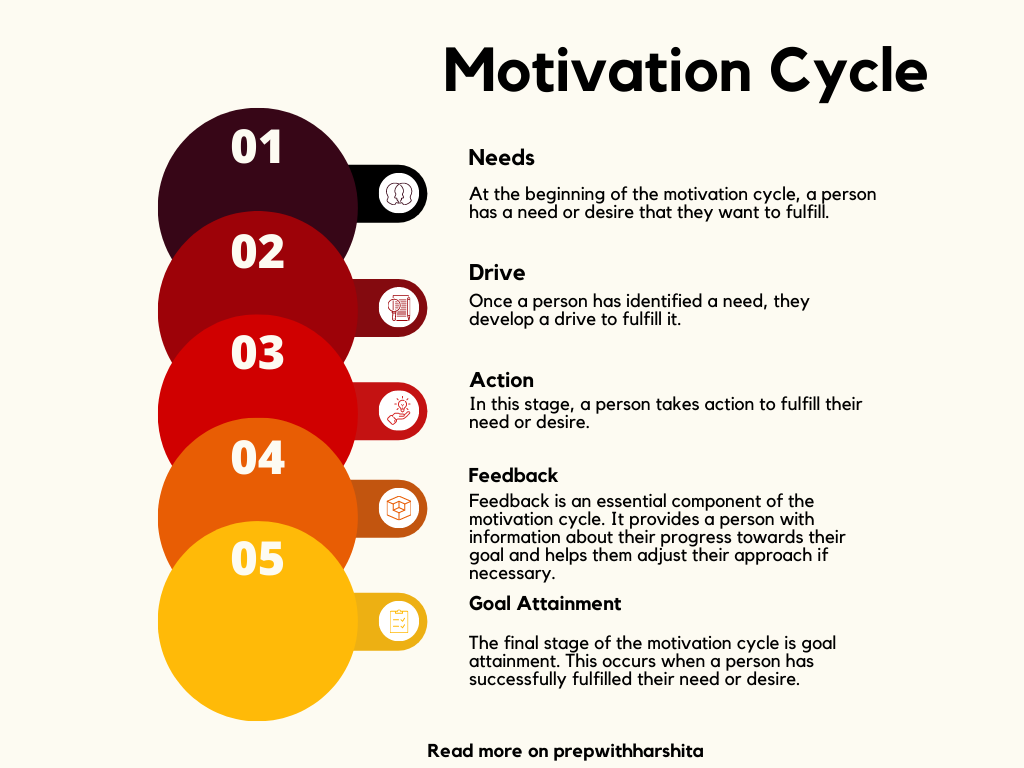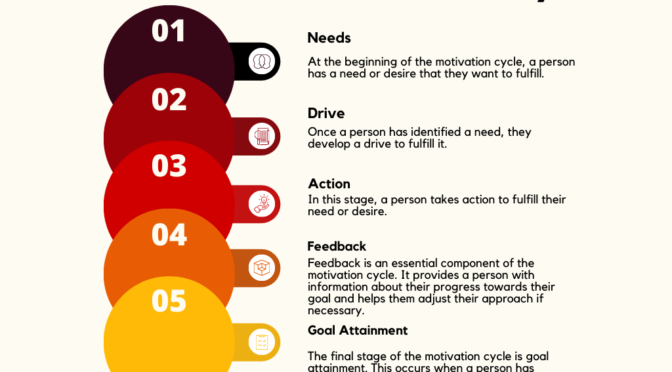The motivation cycle is a psychological framework that explains how human beings are motivated to achieve their goals. It involves several stages, including:
- Needs: At the beginning of the motivation cycle, a person has a need or desire that they want to fulfill. This could be anything from basic physiological needs like food and water to more complex needs like love, achievement, and recognition.
- Drive: Once a person has identified a need, they develop a drive to fulfill it. This drive is the energy that propels a person towards their goal. It can be influenced by internal factors like emotions and external factors like incentives and rewards.
- Action: In this stage, a person takes action to fulfill their need or desire. They may use problem-solving skills, creativity, and perseverance to overcome obstacles and achieve their goal.
- Feedback: Feedback is an essential component of the the cycle. It provides a person with information about their progress towards their goal and helps them adjust their approach if necessary. Positive feedback can increase motivation, while negative feedback can decrease it.
- Goal attainment: The final stage of the cycle is goal attainment. This occurs when a person has successfully fulfilled their need or desire. Achieving a goal can provide a sense of satisfaction, accomplishment, and self-efficacy.
The motivation cycle is an ongoing process that can be repeated as a person identifies new needs and desires. Understanding this cycle can help individuals and organizations develop strategies to increase motivation and achieve their goals.
Also Read: Types of Motivation



Can you give me a published reference where an author talks about feedback as a stage of the motivational cycle?
Thanks for engaging with our blog. Your thoughtful feedback means the world to us every day.
Appreciating the dedication you put into your site and detailed information you present. It’s great to come across a blog every once in a while that isn’t the same unwanted rehashed material. Fantastic read! I’ve saved your site and I’m including your RSS feeds to my Google account.
Viagra * Cialis * Levitra
All the products you are looking seeking are currently close by for 1+1.
4 more tablets of an individual of the following services: Viagra * Cialis * Levitra
https://xn--2i0bm4p0sf2wh7vdmsy.net
Viagra * Cialis * Levitra
All the products you are looking suitable are currently convenient for the duration of 1+1.
4 more tablets of identical of the following services: Viagra * Cialis * Levitra
https://hp9.kr
I really enjoyed reading this. Your perspective is unique and thought-provoking. Keep up the amazing work!
pisogame
Your point of view caught my eye and was very interesting. Thanks. I have a question for you.
Viagra * Cialis * Levitra
All the products you are looking suitable are currently at one’s disposal for the duration of 1+1.
4 more tablets of an individual of the following services: Viagra * Cialis * Levitra
https://hp9.kr
“I Don’t Need Google” T-shirts are a playful way to express self-confidence and humor. The slogan suggests that the wearer has all the answers and doesn’t need to rely on search engines for information. These shirts are popular among people with a witty sense of humor, often appealing to tech lovers or anyone who enjoys making a sarcastic statement. With their bold, cheeky message, they add a fun and unique touch to casual wardrobes. https://heylink.me/tshirts/
Amazing post. Are you searching for the best way to upgrade your streaming audio? If so, Sound Buttons offers a massive library of sound effects, memes, and clips, plus an easy-to-use tool for creating and sharing custom soundboards. Check out an informative post for further details.
Viagra * Cialis * Levitra
All the products you are looking an eye to are currently available for 1+1.
4 more tablets of identical of the following services: Viagra * Cialis * Levitra
https://xn--2i0bm4p0sf2wh7vdmsy.kr
I really enjoyed reading this insightful breakdown of the motivation cycle! It’s fascinating how it highlights the importance of feedback at each stage. The way feedback can either fuel or hinder motivation resonates deeply, as it reminds us of the critical role it plays in shaping our progress. The cycle’s emphasis on continuous action and adjustment is also a great reminder that motivation isn’t static – it’s a dynamic process. I think this is a powerful framework to help individuals stay on track toward their goals. Thanks for sharing this valuable perspective! jasa arsitek